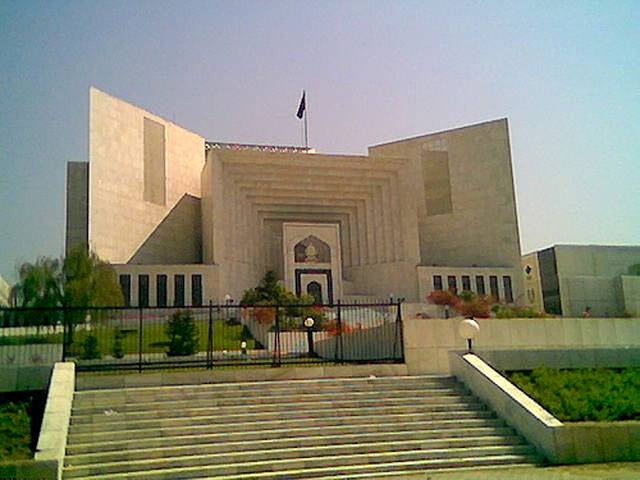ISLAMABAD - Taking notice of the controversy between the Election Commission of Pakistan (ECP) and the federal government over nomination papers for candidates, the Supreme Court on Tuesday said the ECP should act strong as the apex court of the country stands by it.
The SC said the executive authority in terms of Article 190 should not hesitate to implement the SC judgment in letter and spirit in the Workers Party case. The judgment had stated in clear terms that the ECP must exercise independence and use its powers to ensure free and transparent elections, while not letting any ill spoil fairness of polls.
Article 190 reads: “All executive and judicial authorities throughout Pakistan shall act in aid of the Supreme Court.”
In its written order on Tuesday, the SC bench ordered the federation and the ECP to submit a comprehensive report on the steps taken for the implementation of its verdict. The deputy attorney general was directed to seek instructions from the quarters concerned with reference to the implementation of the judgment, while the counsel for ECP was asked to place before the court the amendments suggested and the steps taken for the implementation of its judgment.
The court said that last year in the judgment on Workers Party’s petition regarding election reforms, the court had interpreted various constitutional provisions, particularly Article 218 (3) of the Constitution elaborately, so there should not be any technical problem to control the difficulties faced by the Commission in organising, conducting and making arrangements for holding the coming elections honestly, justly and fairly in accordance with the Constitution.
In the verdict, the court had directed the ECP to frame rules, issue instructions to provide legal sanction to these measures and implement the same to achieve the ultimate objective of fair, free, just and impartial elections.
During the proceedings, the chief justice remarked that the Election Commission was empowered to frame rules to ensure just, fair and transparent elections in accordance with the law, besides preventing corrupt practices.
Chief Justice Chaudhry, heading a three-member bench which heard the case of controversy between the ECP and the federation over nomination papers, said the judgment was a key to democracy. The registrar office sent a note based on media reports on the controversy over nomination papers.
“Under Article 218 (3), the Election Commission is assigned the duty of organising and conducting the election,” said the CJP and questioned why the ECP was showing weakness in organising the election in a fair and free manner.
Article 218 (3) says: “The Election Commission will organise and conduct the election and make such arrangement as are necessary to ensure that the elections are conducted honestly, justly, fairly and in accordance with law, and that corrupt practices are guarded against.”
Justice Sheikh Azmat Saeed, member of the bench, asked Deputy Attorney General Dil Muhammad Alizai, who represented the federation, to name any sane person who could say before the court that he did not want fair, free and transparent elections in the country.
The DAG replied there was no hurdle from the federation in this regard. He said: “The federation and the president want free, fair and transparent elections in the country.” Munir Paracha also said the elections would be held in a fair, just and transparent manner.
The chief justice said: “The court passed the judgment in 2012 and if there is any violation, we know how to enforce it,” adding they would back the ECP in conducting, organising and making arrangements for the upcoming general elections. “We have to protect the Constitution and, if need be, we will hear the cases on day-to-day basis,” he held.
Justice Chaudhry questioned why doubts were being creating unnecessarily about the upcoming general elections. “This nation has suffered a lot in the past,” he said, adding this was a high time to check it.
The case was adjourned till March 13.
In the judgment in Workers’ Party case, the SC had said the commission was responsible not only for conducting the elections itself but also for making all necessary arrangements. The EC can also exercise its powers in anticipation of an ill that may render the elections unfair. Para 44 of the judgment says, “The Election Commission stands as an independent and fully empowered constitutional body. The 18th and 20th Constitutional amendments have substantially enhanced the degree of independence and the scope of powers enjoyed by the EC.”
Saturday, April 20, 2024
SC puts its weight behind ECP

Pak economy improving, funds will be provided on request: IMF
9:57 PM | April 19, 2024
Minister advocates for IT growth with public-private collaboration
9:57 PM | April 19, 2024
Judges' letter: IHC seeks suggestions from all judges
9:55 PM | April 19, 2024
Formula 1 returns to China for Round 5
9:05 PM | April 19, 2024
Germany head coach Julian Nagelsmann extends contract till 2026 World Cup
9:00 PM | April 19, 2024
A Tense Neighbourhood
April 19, 2024
Dubai Underwater
April 19, 2024
X Debate Continues
April 19, 2024
Hepatitis Challenge
April 18, 2024
IMF Predictions
April 18, 2024
Kite tragedy
April 19, 2024
Discipline dilemma
April 19, 2024
Urgent plea
April 19, 2024
Justice denied
April 18, 2024
AI dilemmas unveiled
April 18, 2024
ePaper - Nawaiwaqt
Advertisement
Nawaiwaqt Group | Copyright © 2024





